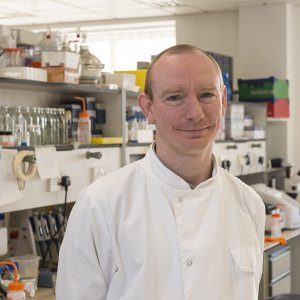
Jake is a molecular microbiologist who studies the signalling pathways that control plant colonisation and infection by pathogenic and beneficial Pseudomonas species.
His lab investigates how bacterial signal transduction pathways respond to inputs from the environment, and how this in turn regulates bacterial behaviour.
The Malone lab specialises in the analysis of complex bacterial second-messenger signalling and translational regulatory networks. Our multidisciplinary approach uses molecular microbiology, biochemistry and cutting-edge system biology techniques alongside plant colonisation and infection experiments.
Jake’s research is focussed on combatting agriculturally-relevant plant diseases that are either caused or suppressed by Pseudomonas species. His lab also investigates the effect of plant genotype on microbial communities within the soil, and how this may be exploited for agricultural benefit.
The Malone lab’s primary interests are:
- Pseudomonas signal transduction in response to environmental stimuli
- Bacterial infection and colonisation mechanisms in both plants and humans
- Identifying bacterial genes and pathways that suppress plant disease and contribute to plant health
Selected Publications
- Thompson CMA, Hall JPJ, Chandra G, Martins C, Saalbach G, Panturat S, Bird SM, Ford S, Little RH, Piazza A, Harrison E, Jackson RW, Brockhurst MA, Malone JG (2023)Plasmids manipulate bacterial behaviour through translational regulatory crosstalk.PLoS biologyPublisher's version: 1544-9173
- Thompson CMA, Little RH, Stevenson CEM, Lawson DM, Malone JG (2022)Structural insights into the mechanism of adaptive ribosomal modification by Pseudomonas RimK.ProteinsPublisher's version: 0887-3585
- Krishna PS, Woodcock SD, Pfeilmeier S, Bornemann S, Zipfel C, Malone JG (2021)Pseudomonas syringae addresses distinct environmental challenges during plant infection through the coordinated deployment of polysaccharides.Journal of experimental botanyPublisher's version: 0022-0957
Opportunities
Enquiries to join the group from interested Postgraduate Researchers and Postdoctoral Scientists are always welcomed.
Fellowship and PhD studentship positions can potentially be funded by the BBSRC, EU or John Innes Centre.
